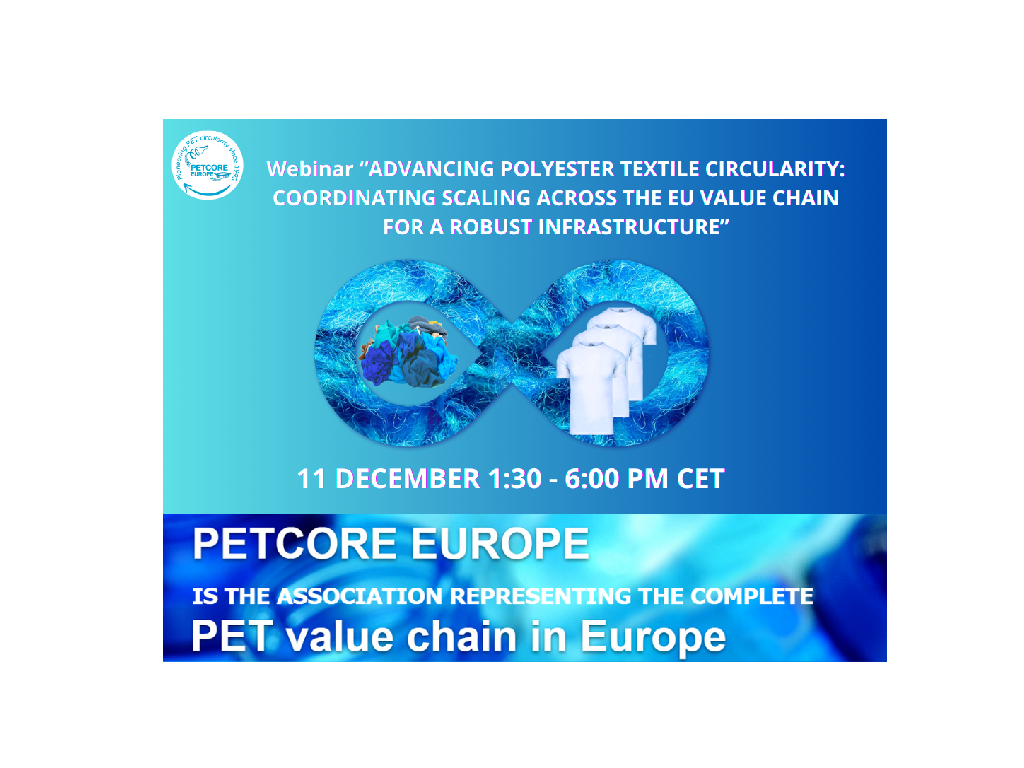THE ONLY ONLINE WEBINAR "ADVANCING POLYESTER TEXTILE CIRCULARITY: COORDINATING SCALING ACROSS THE EU VALUE CHAIN FOR A ROBUST INFRASTRUCTURE” 11th DECEMBER
Don't miss your chance and register today! Textile SIG of PETCORE EUROPE, the Brussels-based polyester value chain association, is hosting an online webinar dedicated to the latest developments in TEXTILE PES/PET recycling. This event will provide insights into advancements in mechanical, depolymerization and sorting technologies, while also exploring the challenges of scaling the necessary collection & sorting quantities through the recycling process. We will also take an opportunity to evaluate the feasibility of aligning these initiatives with EU regulatory goals.
Agenda - 1:30 PM CET - 11 DECEMBER 2024
13:30-14:30 Circularity in Textiles and Sustainability Challenges
13:30-13:35 Welcome by Antonello Ciotti – PETCORE EUROPE
13:35-13:40 Introduction by Christian Crépet - PETCORE EUROPE and Bruno Langlois - Carbios
13:40-14:00 Overview of Current Circularity Challenges in the Polyester Textile Industry and the Role of Circularity in Driving Sustainable Development:
Key statistics and figures. Textile imports & production, EU Collection & sorting for PET by Loic Mace - Axens & Frederic Favre & GAUTHIER Thierry - IFPEN
The complexity of materials: Polyester, Polycotton, Polyester/Elastane, and PO/PA by Bruno LANGLOIS - CARBIOS
14:00-14:15 Developing EU-wide End-of-Waste criteria for textile waste by Lukas Egle - European Commission
14:15-14:30 Q&A session with Lukas Egle - European Commission
14:30-15:50 Technologies and Innovation Deployment moderated by Raphael Jaumotte - PETCORE EUROPE:
a. Overview of PET Recycling Technologies supporting polyester textile circularity.
14:30-14:40 Recognition and automatic sorting by Jo Eikeland Roald - TOMRA & Eric Westerhoff - Pellenc ST
14:40-14:50 Depolymerization recycling, multiple technologies, including glycolysis, hydrolysis, enzymatic, solvolysis and methanolysis by Maurizio Crippa - Gr3n Recycling
14:50-15:00 Mechanical recycling: updates from Starlinger, Erema and Coperion by Wolfgang Herman - Erema
15:00-15:10 Return of experience on Mechanical and Depolymerisation Recycling – Anca Pora (Green Group)
15:10-15:20 Q&A
b. 15:20-15:30 Geographical Presence and Development - Philip Boydell
- Mapping and Panorama: Present and Future Outlook
- Pilot units and Technology Readiness Levels (TRL)
- Ongoing and finalized industrial projects (Capacities)
c. 15:30-15:40 Indicative Value Chain Costs by Bruno Langlois - Carbios
- Breakdown of costs across the value chain: Collection, sorting, preparation for recycling, mechanical recycling, depolymerization, repolymerization
- Learnings from existing studies (Mc Kinsey, …)
15:40-15:50 Q&A Session
15:50-16:00 Coffee break
16:00-16:20 Essential Tools for Recycling and Mandatory Design Standards for Circularity by Josse Kunst - CuRe TECHNOLOGY
- Guidelines for Circularity in Polyester-Based Textiles
- Collection & Sorting
- Preparation for depolymerization & mechanical recycling
- Design for Recycling for clothing
- Update on T-Rex
16:20-16:25 Q&A Session
16:25- 16:50 Current State and Global Collaboration for EU Alignment on SIMULTANEOUS SCALABLE SOLUTIONS by Christian Crépet - PETCORE EUROPE
- Alignment Across the EU to organize the circular value chain:
EPR, collection, sorting and preparation deployment updates
- Collection schemes deployment
Reverse logistics strategies, asset recovery, take-back programs, voluntary return, kerbside, charity led
Consumer education and incentivizing
- Regulatory Framework to support deployment of a circular value chain
Recycled content, End-of-Waste, Waste shipment, Textiles labelling, industry standards, Enforcement and Monitoring
16:45-16:50 Q&A on how can the textile industry be ready to harmonize simultaneously scaling for an EU sustainable success?
16:50-17:05 The key challenge lies in driving global expansion of textile circularity while simultaneously aligning all recycling steps across the EU moderated by Bruno Langlois - Carbios
Stakeholder Perspectives on an harmonize & synchronized collective effort for an EU PET circular economy
17:05-17:15 Insights from EPRs & Refashion by Christian Crépet - PETCORE EUROPE
17:15-17:30 European Commission - DG Grow - António de Sousa Maia
17:30-17:45 Associations by Karla Magruder - accelerating Circularity
17:45-18:00 Q&A Session
- Could a global forum on synthetic fibers, similar to the Circular Plastics Alliance led by DG GROW for plastic packaging, promote global collaboration, synchronized growth through a transparency attitude to evaluate progress across the value chain and be helping for regulatory adjustments?
- Ensuring compliance through continuous monitoring.
18:00-18:10 Wrap-up and Conclusions by Christian Crépet - PETCORE EUROPE


